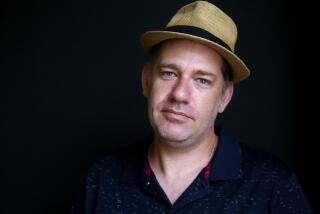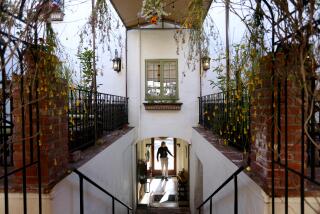Key West Developer Puts Taste Before Profit, Wins Praise From Conchs
- Share via
KEY WEST, Fla. — The multimillionaire developing the choicest chunk of Key West, having clawed his way out of poverty, now fears that his money will corrupt him.
“The habitual creation of wealth for its own sake destroys souls,” frets Pritam Singh, a 35-year-old hippie-turned-capitalist, as he recounts King Midas’ bitter lesson. “I don’t want that to happen to me.”
Singh first dreamed up the $200-million “small town” he is building here years ago, at the commune where he became converted to the Sikh faith.
The 102-acre Truman Annex property, site of President Harry S. Truman’s beloved “Little White House” winter retreat, became a ghost town after the defunct Navy base there went to public auction in September, 1986.
Singh paid $17 million for the spot and a chance to fulfill his dream of building a 19th-Century-style village of houses and condominiums where neighbors are neighborly.
Land Boom in Keys
That’s not all he is accomplishing in this overbuilt city, where soaring prices have made out-of-town developers as welcome as hurricanes.
When the Annex property went to auction, city officials feared slick outsiders concerned strictly with profit would replace historic buildings with towers of condominiums. Instead they got Singh, odd-looking in his scraggly beard, turban and trademark jeans, but a man with a reputation for doing quality renovations in New England.
Now the former poor boy is on his way to hero status among the locals, who call themselves Conchs.
Singh cultivated the Conchs last year by asking them how he should develop his land, and hundreds of them packed town meetings to tell him. He used some of their ideas, and celebrated the opening last year by tossing a $35,000 party for the locals.
In April, 1987, the mayor was one of 300 guests when Singh was married in a Sikh ceremony on the Little White House lawn. At Easter, he and his wife gave the local children an egg hunt. Singh dressed as the Easter bunny and passed out goodies.
Some Units ‘Affordable’
Singh is building at least 125 “affordable” condominiums priced under $100,000, well below the $225,000-to-$700,000 value of the 126 others. Resale profits on the affordable units, meant for his employees, will be capped to keep out speculators.
The first units should be finished at the end of this year. Besides the condominiums and 61 single-family home sites, Singh is also building a yacht club, marina and artists’ retreat. On Sunset Island, a short ferry ride from the mainland property, he’s building a lagoon and a 154-room hotel, and is importing sand from the Bahamas to develop a beach.
Some of the projects of Singh’s Great Bay Co., which was founded in 1978 and has offices in Portland, Maine, Boston and now Key West, include the $11-million Inn By The Sea in Cape Elizabeth, Maine; the $2-million Merchants Row retail complex in a 19th Century port warehouse in Portland; the $3.1-million Ammerdown Place apartments renovation, also in Portland; the $2-million Petroleum Building in the historic district of Santa Fe, N. M.
Soon after Singh bought the Truman Annex, he wooed the city commissioners by taking them on a $10,000 trip to see the hotel and his smaller projects in Maine. Impressed, the commissioners promptly agreed to rewrite the city development plan so Singh could build 25% more units in Key West.
Architecture Blends In
Locals are pleased that he is following the Conch-style architecture of porches, steeply sloped roofs, cupolas and widow’s walks.
“I think, to a man, you’ll find people pleased with everything he’s done,” said former Monroe County Commissioner Wilhelmina Harvey, a fourth-generation Conch.
Singh’s “small town” idea has also been a hit with buyers. Since sales began March 7, nearly all the condominium units and many of the single-family building lots have been taken.
“The vital concept is interaction,” Singh said. “More and more in America, people don’t talk.”
There will be no individual mail delivery in his community. “We’ll build our post office and all the people who live there will pick up their own mail. It’s going to have a porch with chairs, a coffee machine. You can sit on the porch and meet your neighbors, talk to each other, become friends.”
The fast sales at the Annex don’t surprise Key West real estate agent Anthony Yaniz. He said prices there are par for this city which is about the size of Miami International Airport.
$150,000 Fixer-Uppers
“We’ve been discovered,” Yaniz said. “Ernest Hemingway called this place the St. Tropez of the poor. That’s no longer true.” Condominiums go for $60,000 to $500,000, and a concrete-block house downtown, in need of repairs, will bring about $150,000, he said.
Ambiance is more important than squeezing in the maximum number of units, Singh maintains, and his buddy from commune days, Stephen Josephs, now a Truman Annex Co. vice president, agrees.
“I knew it was going to be an adventure,” Josephs said, “and Pritam and I never gave up this dream of creating a community.”
This will be the last major project he’ll undertake, says Singh, whose son was born at home here on his birthday, Dec. 22. But he says he won’t retire.
“Religion and his terror of being poor are his driving factors,” said John Cole, a Maine writer whose children were friends with the developer before his conversion to Sikhism.
In those days, Singh was Paul LaBombard, a French Canadian born in Fitchburg, Mass., who is the oldest of four sons. His parents divorced and remarried each other four times. His mother worked in a shoe factory.
Childhood of Poverty
“My family was extremely poor. Thursday was mustard sandwiches” for dinner, he recalled. College was “not even an option.”
Later, the family moved to Maine and he went to Brunswick High School. He sometimes stayed with friends, such as Cole’s family.
“He wasn’t a hell-raiser in an evil sense,” said retired vice principal Jack Caldwell, who remembered Singh well. “I had to drive him home quite often because we often had to suspend him for skipping school. He hung around with a group that did quite a bit of rebelling, but he was quite likable.”
After graduation, Singh briefly bummed around in Key West and then moved to the commune, where he met the woman who became his first wife and was converted to Sikhism.
Singh lived for about a year 16 years ago at the commune in Amherst, Mass., called Guru Ram Dass Ashram. The Sikhs are vegetarians and neither smoke nor take alcohol.
Singh was reared a Catholic, but said: “I had a problem with the ambiguities of religion. I never separated moral justice from social justice.” He rejected Buddhism as atheistic but liked the Sikh faith from the start.
Tasted Sikh Hospitality
“Sikhism has one God. Women and men are equal,” he said. In 1975, he traveled to the sect’s Golden Temple in India “to see if it was real. I had a tremendous trip. Sikhs are real interesting people. I felt justified in my belief.”
What impressed him most in India was the Sikhs offering him food and lodging, no questions asked. “They didn’t ask me for anything. I couldn’t believe it!” His conversion was sealed.
In 1979, he scraped up $7,500 to buy and renovate an apartment house. He went on to develop a shopping center and soon was trying his Midas touch on historic buildings, now his specialty. By 1983, his marriage had disintegrated but his thriving business had made him a millionaire.
His family lives simply in a renovated Conch house on his land here. Diapers dry on the line outside. Inside, the hardwood floors are covered with scatter rugs and much of the furniture is of white wicker.
Avoids Television
There are no television sets in Singh’s home, because he can’t keep his hands off them.
“Every time I stay in a hotel, I turn on the TV. They’re like voodoo machines.”
Instead, he spends about $1,000 a year on books and relaxes at his farm in Vermont, which has a temple, waterfall, a maple grove and Japanese and English gardens. He keeps sheep and llamas.
“It’s the place I do things I dreamed about doing.”
Key West, Singh says, will be his home even after this development is finished, probably in two years. Then the man with the Midas touch will think about relaxing.
“I’m at a cusp. There has to be a balance. The question of ethical livelihood is the thing I’m most interested in,” Singh said.
“I’d like to be involved in a way that I don’t get eaten.”
More to Read
Inside the business of entertainment
The Wide Shot brings you news, analysis and insights on everything from streaming wars to production — and what it all means for the future.
You may occasionally receive promotional content from the Los Angeles Times.










